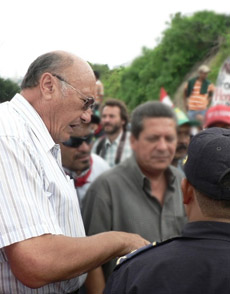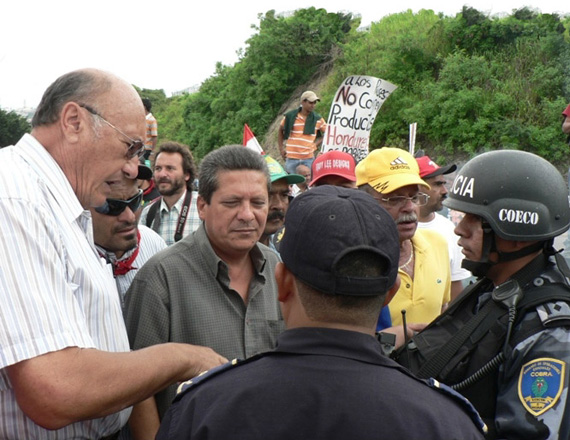|
After only
15 days, the coup is no longer making international headlines. And repression is
escalating, with a former union leader and anti-coup activist killed in San
Pedro Sula.
|

Carlos Reyes |
|
This maneuver to give the appearance that everything is
normal -which includes the mediation process underway in
Costa Rica under the auspices of the US State
Department- and the withdrawal of the media could result
in a fierce repression of the popular organizations that
continue to demand the restoration of the democratic
order. |
|
From day one of
the military and civilian coup in Honduras, the media strategy of the Honduran
de facto government has been to give the image of business-as-usual. The mass
protests and marches, it claims, are the expression of a “few deranged” people
who refuse to accept the new state of affairs.
This maneuver
to give the appearance that everything is normal -which includes the mediation
process underway in Costa Rica under the auspices of the US State
Department-, together with the withdrawal of the media, could culminate in a
fierce repression of the popular organizations that continue to demand the
restoration of the democratic order.
Following the
world’s condemnation of the coup, the great expectation raised by President
José Manuel Zelaya’s move to return to the country, and the failed
attempt at mediation in Costa Rica, leading international media teams
have abandoned the country. Telephones are no longer ringing off the hook, and
the coverage of Honduras by international news agencies has dwindled down
to a few lines.
The ongoing mobilization of the
country’s civil society, grassroots and labor organizations is no longer
newsworthy, and the situation for the international media that remains in the
country has become very risky.
At dawn
yesterday, the news teams of TeleSur and the Venezuelan TV channel
VTV
were first
arrested and then forced to stay inside their hotel rooms, thus preventing them
from exercising their right to cover today’s events. The journalists also
reported that they were intimidated by police officers, who told them to go
straight to the airport “because
there’s nothing here for you to cover, nothing for you to inform.”
As popular
organizations continue organizing mass mobilizations -such as this weekend’s
rally in memory of Isis Obed Murillo, the 19-year-old boy shot to death
at the airport as he awaited Zelaya’s return on July 5, and the demonstration
held in Tegucigalpa’s central park- and as the international media’s interest in
the crisis declines, the leaders of the National Front Against the Coup
fear an even harsher wave of repression.
On the night of
Saturday, July 11, Popular Block activist
Roger Bados,
a
former textile unionist and leader of the United Workers’ Federation of Honduras
(FUTH), was
murdered by strangers outside his house in the northern city of San Pedro Sula.
Activists fear that this homicide marks the beginning of a plan to kill
mid-ranking leaders with the aim of terrorizing the population.
With the
international community apparently reluctant to move from words to action, bent
as it is on a mediation process destined to fail and visibly influenced by the
US government’s ambiguity,
Sirel met with Carlos H. Reyes, general secretary of the Union
of Beverage and Related Industry Workers (STIBYS) and member of
the IUF’s International Executive Committee, to discuss the current
situation.
-It’s been 15 days of resistance and struggle. Very difficult days in which
Hondurans proved they could respond to the coup and stand up to the repression
that followed. What is your assessment of these efforts?
-The popular movement has made major progress in terms of the quality of the
political battle it is waging. If it hadn’t been for the existence of the
National
Coordinating Body for Popular Resistance,
which has been the backbone of this movement of opposition to the coup, it
would’ve been impossible to achieve such a level of struggle and to carry out
these actions of resistance. We were able to overcome the shock of the coup and
the fear of the repression unleashed by this de facto government and go on to
stage the largest demonstration ever in the history of the country and organize
a number of actions, such as occupying highways and holding mobilizations,
sit-ins and political and cultural acts.
-Do you think
the government will step up its repressive actions?
-As the coup’s
perpetrators realize they can’t control us and that they’re faced with a huge
opposition, they’ve started to show signs of wanting to step up their repression
of the people. On Sunday, July 5, Isis Obed Murillo was killed near the
airport, and just this Saturday former FUTH leader and Popular Block
activist Roger Bados was killed in San Pedro Sula. We have also been
informed that the police forced Venezuela’s TeleSur and VTV news
teams out of their hotel and ordered them to leave Honduras.
We believe that
these acts are part of a repression that is escalating in the country with the
aim of intimidating us so we will stop our resistance.
-What do you
have planned for this week?
-We are going
to continue our struggle with numerous mobilizations, because this is going to
be a very difficult week. The mediation process in Costa Rica failed,
because, as we said, this problem cannot be solved through such means. This
crisis has a bottleneck, which is the duplicity of the United States,
because on the one hand the US condemns the coup and supports the
resolution of the OAS, while on the other it supports the forces behind
the coup. We must put an end to that situation, which is why a delegation of the
National Front Against the Coup has traveled to the United States
to meet with several US senators.
-There is a
clear attempt by the de facto government to paint a peaceful picture of Honduras
and pretend that everything’s business-as-usual in the country. Could the
reduced presence of international media facilitate that strategy?
-Much of the
media pulled out of the country because they were intimidated, and that shows
that there is a deliberate attempt to cover up what’s really going on and that
there was in fact a coup here. TeleSur’s case is emblematic. It has to be
denounced worldwide, to convince the media to come back to the country, because
it’s an indication that there’s going to be an escalation of repressive actions.
-What prospects
are there for keeping the people mobilized on the streets?
-We
are not going to back down in our demand to restore democracy and bring
President José Manuel Zelaya back.
We need to support the President’s efforts to convince other nations to further
pressure the de facto government by calling on our brothers and sisters in
popular organizations from all of Central America to stage mobilizations on the
borders. We also ask organizations from across Latin America to pressure our
embassies in their countries, expressing their solidarity with the struggle of
the Honduran people. Here in Honduras, we’re going to keep fighting.
-The IUF has
given absolute priority to the situation in Honduras and has reiterated its
solidarity with the resistance movement led by popular and labor organizations.
How else can the IUF support this struggle?
-The IUF’s
continuous presence throughout these past two weeks has made it possible to keep
the international labor movement informed on the situation in Honduras
and to report in the most objective way possible that Hondurans are keeping up
their resistance.
There’s a much
deeper problem here, which is that in Honduras defending the interests of
workers is considered a crime, and fighting for social gains is considered a
crime. That is why we support Zelaya’s government in many aspects,
because he was working to defend our rights, and in an ultra rightwing country
like Honduras that in itself is a crime, and we are considered criminals.
But we will continue working and fighting, and we want the IUF to convey
that message to the world.
We are already facing a savage
dictatorship and the military is moving to escalate its repressive actions, the
same military who in the 1980s perpetrated the most heinous crimes.
 |